Leo Strauss and the Problem of Political Philosophy
MICHAEL P. ZUCKERT and
CATHERINE H. ZUCKERT
THE UNIVERSITY OF CHICAGO PRESS
CHICAGO AND LONDON
MICHAEL P. ZUCKERT is a Nancy Reeves Dreux Professor of Political Science at the University of Notre Dame. CATHERINE H. ZUCKERT is a Nancy Reeves Dreux Professor of Political Science at the University of Notre Dame. Together, they are the authors of The Truth about Leo Strauss, also published by the Univerity of Chicago Press.
The University of Chicago Press, Chicago 60637
The University of Chicago Press, Ltd., London
2014 by The University of Chicago
All rights reserved. Published 2014
Printed in the United States of America
23 22 21 20 19 18 17 16 15 14 1 2 3 4 5
ISBN-13: 978-0-226-13573-1 (cloth)
ISBN-13: 978-0-226-13587-8 (e-book)
DOI: 10.7208/chicago/9780226135878.001.0001
Library of Congress Cataloging-in-Publication Data
Zuckert, Michael P., 1942 author.
Leo Strauss and the problem of political philosophy / Michael P. Zuckert and Catherine H. Zuckert.
pages ; cm
Includes bibliographical references and index.
ISBN 978-0-226-13573-1 (cloth : alkaline paper) ISBN 978-0-226-13587-8 (e-book)
1. Strauss, LeoCriticism and interpretation. 2. Political sciencePhilosophy. I. Zuckert, Catherine H., 1942 author. II. Title.
JC251.S8Z8352013
320.01dc23
2013048790
 This paper meets the requirements of ANSI/NISO Z39.48-1992 (Permanence of Paper).
This paper meets the requirements of ANSI/NISO Z39.48-1992 (Permanence of Paper).
This book is dedicated to
ELENA, SABINE, JAMES, AND WILLIAM
Contents
Acknowledgments
We would like to thank the University of Notre Dame for supporting our research for the last fifteen years. The publication of this book was made possible in part by support from the Institute for Scholarship in the Liberal Arts, College of Arts and Letters.
We also wish to thank our friends and colleagues for their encouragement and assistance. We are especially grateful to David Lewis Schaefer, who reviewed the entire manuscript carefully and made useful suggestions for ways to improve it, both substantively and stylistically. Michael Davis read the prologue and .
John Tryneski of the University of Chicago Press encouraged us to meld together the many pieces we had written on Strauss since we published The Truth about Leo Strauss into one coherent statement. Rodney Powell helped us take the manuscript through the many steps to publication. And Les Harris provided us with invaluable assistance in preparing the manuscript.
Earlier versions of some of the chapters have been previously published. was also published as Leo Strausss Two Agendas for Education in Teaching in an Age of Ideology, ed. John Von Heyking and Lee Trepanier (Lanham, MD: Lexington Books, 2013), 183204. All are reprinted here with permission from the publishers.
Abbreviations
All works listed here are by Leo Strauss unless otherwise stated.
| AAPL | The Argument and the Action of Platos Laws (Chicago: University of Chicago Press, 1975). |
| CM | The City and Man (Chicago: University of Chicago Press, 1964). |
| ELN | Essays on the Law of Nature, by John Locke (Oxford: Clarendon Press, 1954). |
| GN | German Nihilism, Interpretation: A Journal of Political Philosophy 26, no. 3 (1999): 35378. |
| HPP | History of Political Philosophy, ed. Leo Strauss and Joseph Cropsey, 3rd ed. (Chicago: University of Chicago Press, 1987). |
| JPCM | Jewish Philosophy and the Crisis of Modernity, ed. Kenneth Hart Green (Albany: State University of New York Press, 1997). |
| LAM | Liberalism Ancient and Modern (New York: Basic Books, 1968). |
| LER | Liberal Education and Responsibility, in LAM, 925. |
| NCS | Notes on Carl Schmitt, The Concept of the Political, in Carl Schmitt and Leo Strauss: The Hidden Dialogue, by Heinrich Meier (Chicago: University of Chicago Press, 2006), 91119. |
| NRH | Natural Right and History (Chicago: University of Chicago Press, 1953). |
| OT | On Tyranny: Including the Strauss-Kojve Correspondence, ed. Victor Gourevitch and Michael S. Roth (Chicago: University of Chicago Press, 2000). |
| PAW | Persecution and the Art of Writing (Chicago: University of Chicago Press, 1952). |
| PPH | Political Philosophy and History, in WIPP, 5677. |
| PPH | The Political Philosophy of Hobbes: Its Basis and Its Genesis, trans. Elsa M. Sinclair (Oxford: Clarendon Press, 1936). |
| PR | Progress or Return? The Contemporary Crisis in Western Civilization, in An Introduction to Political Philosophy: Ten Essaysby Leo Strauss, ed. Hilail Gildin (Detroit: Wayne State University Press, 1989), 249310. |
| RCPR | The Rebirth of Classical Political Rationalism, ed. Thomas Pangle (Chicago: University of Chicago Press, 1989). |
| SA | Socrates and Aristophanes (Chicago: University of Chicago Press, 1966). |
| SCR | Spinozas Critique of Religion, trans. Elsa M. Sinclair (New York: Schocken Books, 1965). |
| SPPP | Studies in Platonic Political Philosophy, ed. Thomas Pangle (Chicago: University of Chicago Press, 1983). |
| TALS | The Truth about Leo Strauss: Political Philosophy and American Democracy, by Catherine Zuckert and Michael Zuckert (Chicago: University of Chicago Press, 2006). |
| TL | Two Lectures, Interpretation 22, no. 3 (1995): 30138. tm Thoughts on Machiavelli (Chicago: University of Chicago Press, 1958). |
| TWM | Three Waves of Modernity, in An Introduction to Political Philosophy: Ten Essays by Leo Strauss, ed. Hilail Gildin (Detroit: Wayne State University Press, 1989), 8198. |
| WILE | What Is Liberal Education?, in LAM, 38. |
| WIPP | What Is Political Philosophy?, in WIPP, 955. |
| WIPP | What Is Political Philosophy? and Other Studies (Glencoe, IL: Free Press, 1959). |
Prologue
Leo Strauss was one of the preeminent political philosophers of the twentieth century. Although most of his work took the form of investigations in the history of political philosophy, his intentions were not simply those of a historian of ideas. His investigations had a philosophical and even, to a degree, a political purpose. His chief goal in both his historical and his more strictly philosophical writings was the restoration of political philosophy as a meaningful, even urgent enterprise. To that end, he delivered stinging critiques of two modern intellectual movements, positivism and historicism, that seemed to make political philosophy no longer possible. Strausss historical inquiries led him to put forward a number of highly controversial theses about the course of Western philosophical history. He placed the beginning of political philosophy, which he presented as a new beginning for philosophy altogether, with Socrates, who, as Cicero said, brought philosophy down from the Heavens and into the cities. Socrates founded a tradition of political philosophy that lasted, in several important variants, until Machiavelli, who revolutionized philosophy and instituted modern political philosophy, or more simply, modernity. Later thinkers subjected the tradition inaugurated by Machiavelli to very significant modifications, called by Strauss waves in a complex intertextual reference to Platos
Next page
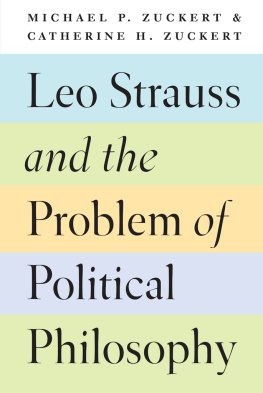
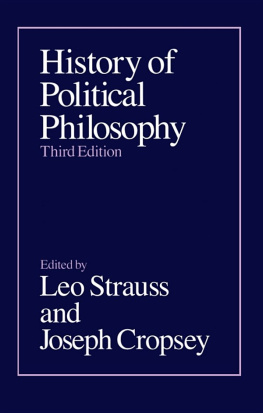
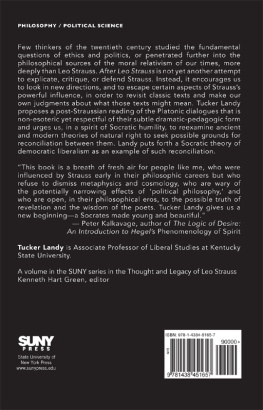

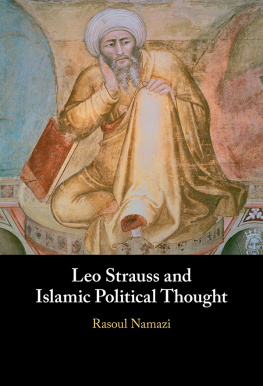
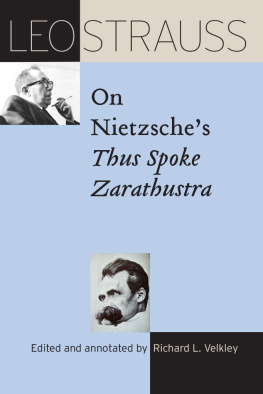
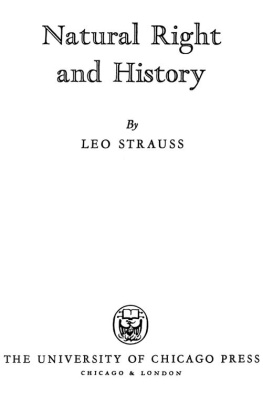

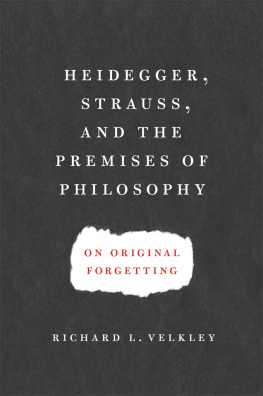
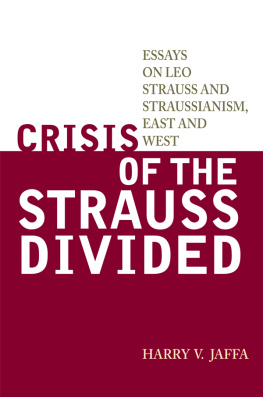
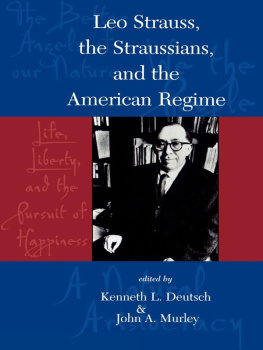
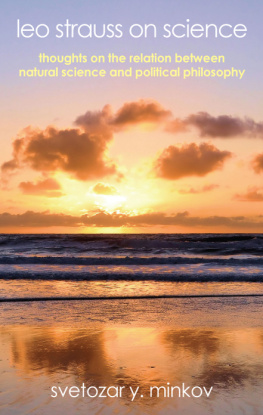
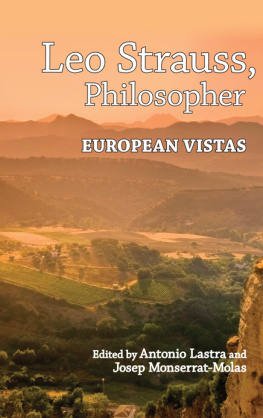
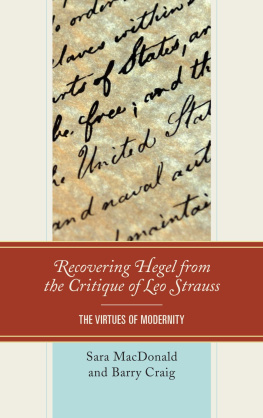
 This paper meets the requirements of ANSI/NISO Z39.48-1992 (Permanence of Paper).
This paper meets the requirements of ANSI/NISO Z39.48-1992 (Permanence of Paper).